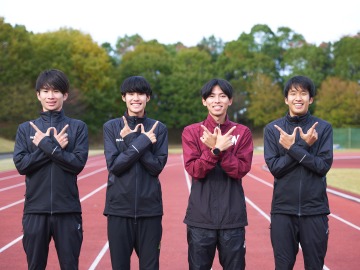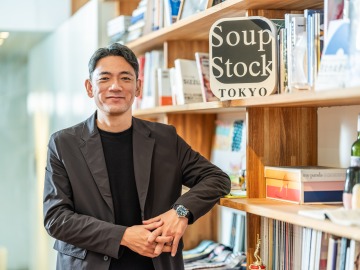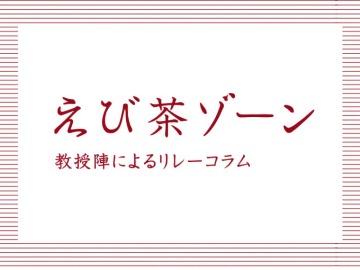The 100th Hakone Ekiden: Waseda’s Team Captain & 3 Ace Runners Participate “The cheers from the fans become our power!”

From January 2-3, 2024 the 100th Tokyo-Hakone Round-Trip College Ekiden Race (hereafter Hakone Ekiden 2024) featured 23 teams competing over a total of 10 wards and 217.1 km. The Waseda University Track & Field Team (also known as the Waseda University Athletic Club), which has participated 92 times since the event was first held, placed 6th in 2023 and 7th in 2024. For this article Waseda Weekly interviewed Team Captain Atsushi Shobu (fourth-year, School of Sport Sciences) and three top runners as they prepared for the 2024 Hakone Ekiden.
Atsushi shared that in addition to the three aces, mood-maker Taishi Ito (third-year, School of Sport Sciences), dependable Haruto Ishizuka (third-year, School of Education), and powerful Tomonori Yamaguchi (second-year, School of Sport Sciences), the team’s strong supporting runners are its strength this year. During the pandemic bystanders were asked to limit their cheering, so Atsushi looked forward to the full-volume cheers of supporters on the sidelines this year. He had heard from his seniors that their ears actually hurt after finishing the race!
Japanese article:第100回箱根駅伝特集 早大主将&エース格3人組登場!「大きな声援が僕らの力に」
Soup Stock Tokyo CEO Sanetsugu Matsuo “I have always stood strong in my beliefs! It’s how I began.”

Soup Stock Tokyo is a popular chain of stores that specialize in soup. The company’s vision is to warm the hearts (and bellies) of its customers. As part of this vision, Soup Stock Tokyo announced in April of 2023 that it would begin serving free baby food at its stores, which stirred up a storm of criticism across the internet. The firm response from the company and its CEO Sanetsugu Matsuo unexpectedly won them the Nikkei BP Marketing Award. Matsuo, who is a graduate of Waseda University, talked with Waseda Weekly about how he spent the five years immediately following graduation. They were filled with valuable experiences and mistakes that ultimately led him to Soup Stock Tokyo.
When he first entered university, Matsuo wasn’t sure what he wanted to do, but he knew he wanted to be at the center of the “storm,” where all the action happens. He first got a taste of this when he worked for Asahi Television’s News Station while still a student. Matsuo reviewed the jobs and positions he held post-graduation, including working in the finance department at a trading company and gaining experience as a manager in charge of UNIQLO’s now defunct brand of fresh vegetables “SKIP.” Thanks to his experience with SKIP, when he came across Soup Stock Tokyo’s canned soup at a convenience store he recognized its potential. Shortly after, Matsuo had the opportunity to meet the company’s founder Masamichi Toyama and brazenly asked him for a job. Matsuo concluded the interview with a message to Waseda students asking them for ideas, adding that there are ideas that only students can produce.
Japanese article:Soup Stock Tokyo社長・松尾真継 原点は「今も昔も生意気上等!」
What Advanced Convenience Brings

A Waseda faculty member contributed this column anonymously for the recurring corner called “Ebicha-Zone,” where Waseda faculty members from a variety of fields reflect on the theme, “What professors want to tell students.”
We are in an age where problems and work that once took time and effort can now be solved or created instantly at a near-expert level using convenient tools. Since the COVID-19 pandemic, it has become commonplace to use devices during lectures, prompting students to improve their computer literacy, which then became a driving force for producing high-quality assignments and work in a short period of time. Additionally, in response to increased access to online classes and telework, devices themselves have further evolved, greatly improving the convenience of learning and work.
However, it is not all good news. While the world has become more convenient, the amount of work students must handle has also increased. Furthermore, since anyone can now create high-quality work, originality and ingenuity are put to the test, which inevitably increases the time required to complete a single task while also increasing the number of tasks. This has led to adverse effects on student’s mental health. It is an essential part of one’s education to spend time through trial and error and experience the joy of completing a task, but how long can that last in an era that prioritizes speed and efficiency while putting generative AI to practical use?
Japanese article:利便性の向上がもたらしたもの







